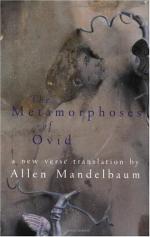|
This section contains 2,372 words (approx. 8 pages at 300 words per page) |

|
SOURCE: Wheeler, Stephen M. “Ovid's Use of Lucretius in Metamorphoses 1.67-8.” Classical Quarterly 45 (n.s.) (1995): 200-03.
In the following essay, Wheeler argues that Ovid's description of the winds in the Metamorphoses as ungoverned by a controlling power is drawn from Lucretius' De Rerum Natura, and is in opposition to Vergil's view in the Aeneid that Jupiter controls elemental forces.
haec super inposuit liquidum et gravitate carentem aethera nec quicquam terrenae faecis habentem.
(Ovid, Met. 1.67-8)
Here Ovid treats the demiurge's disposition of weightless aether over the other elements.1 This section of the cosmogony follows one that is devoted to the sphere of aer (52-66) where the creator settles the turbulent winds and other threatening meteorological phenomena. Recently Denis Feeney has suggested that Ovid's demiurge ‘does not act in a very epic manner’ by placing weightless aether on top of the winds.2 He argues: ‘The oddness of the control...
|
This section contains 2,372 words (approx. 8 pages at 300 words per page) |

|


